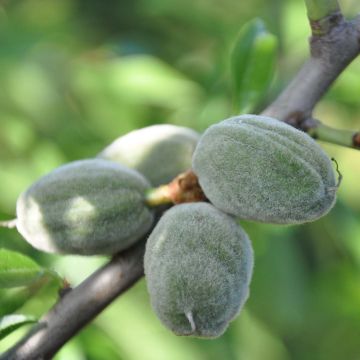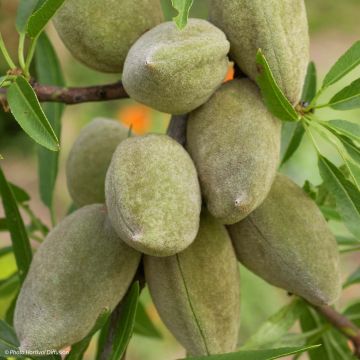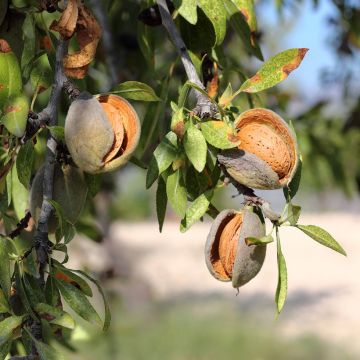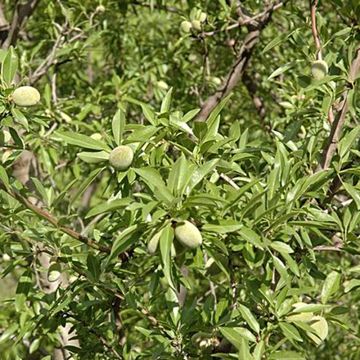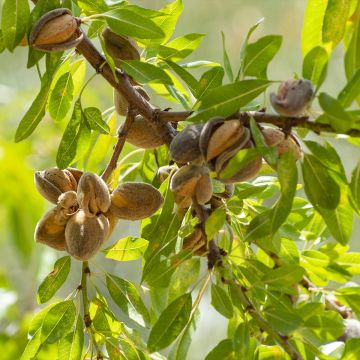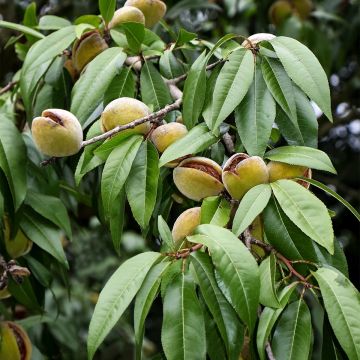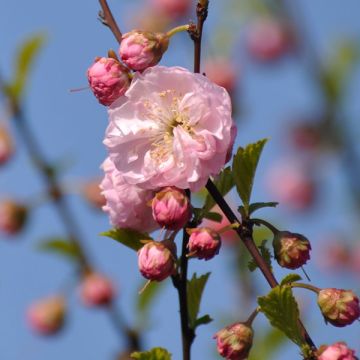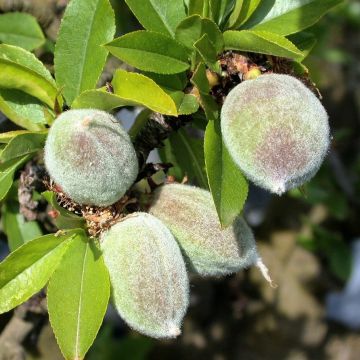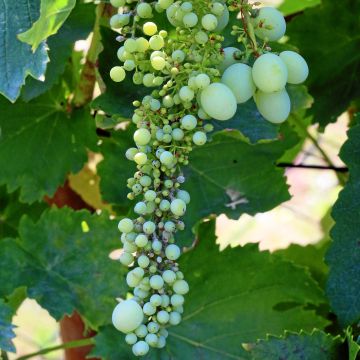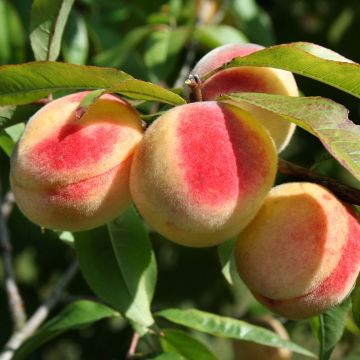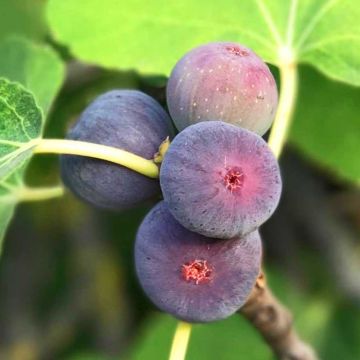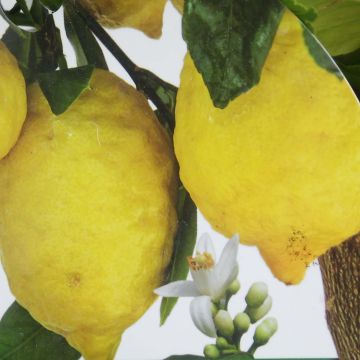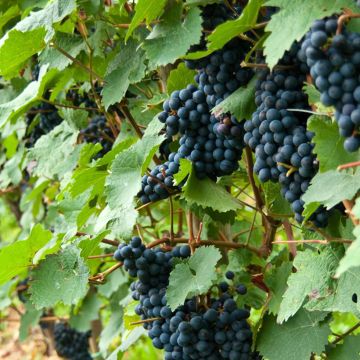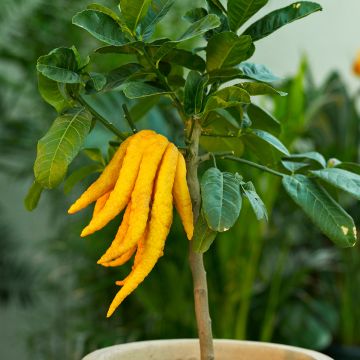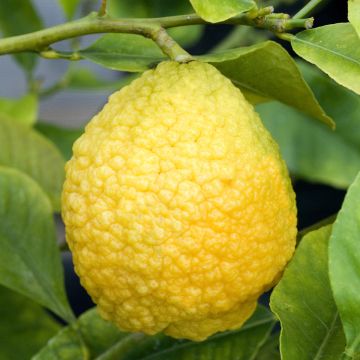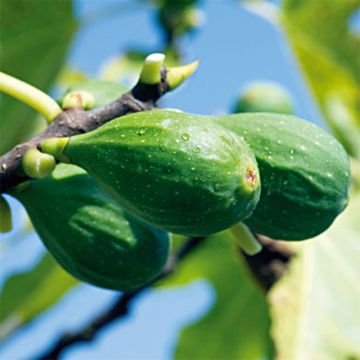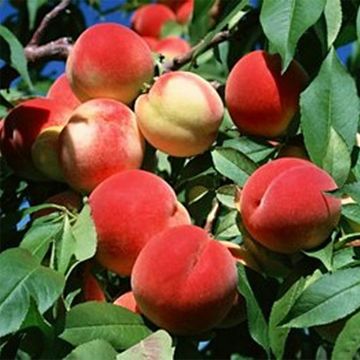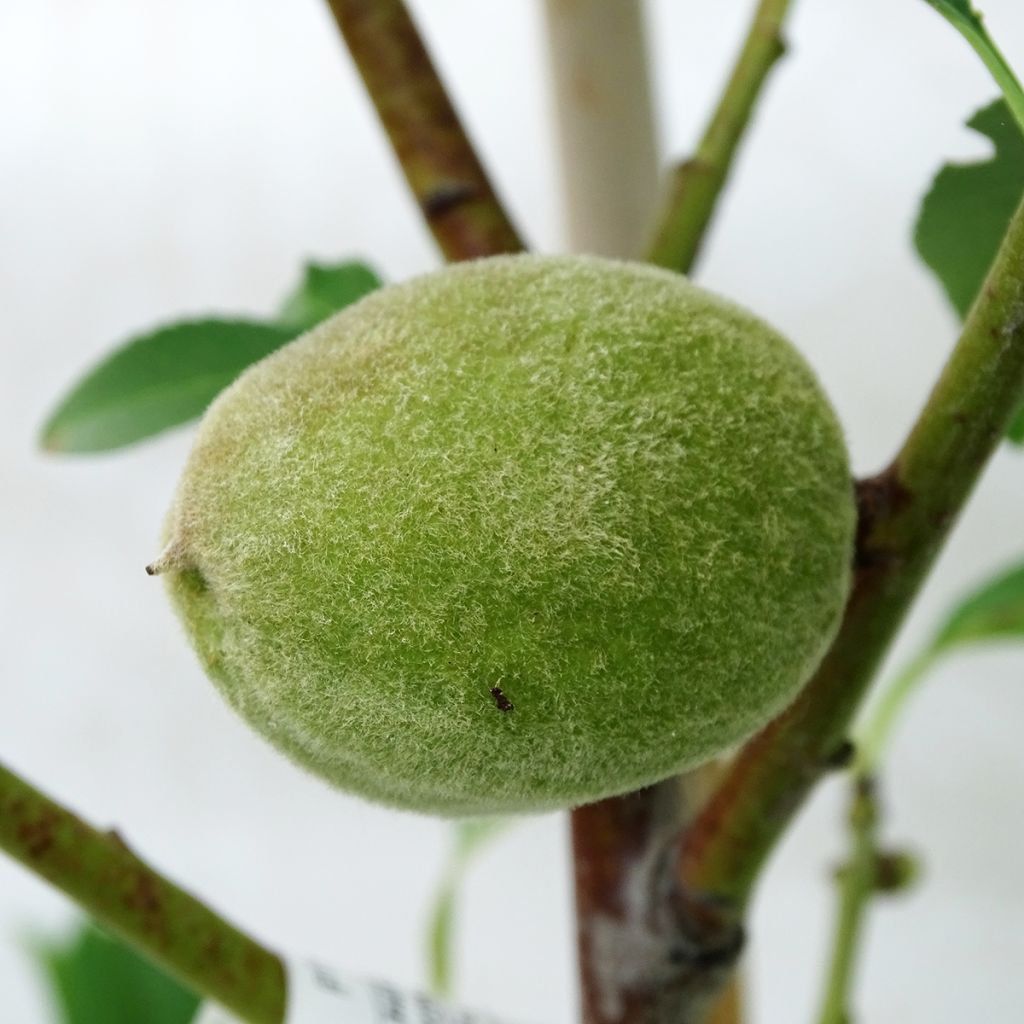

Amandier Texas Bio en racines nues, forme scion
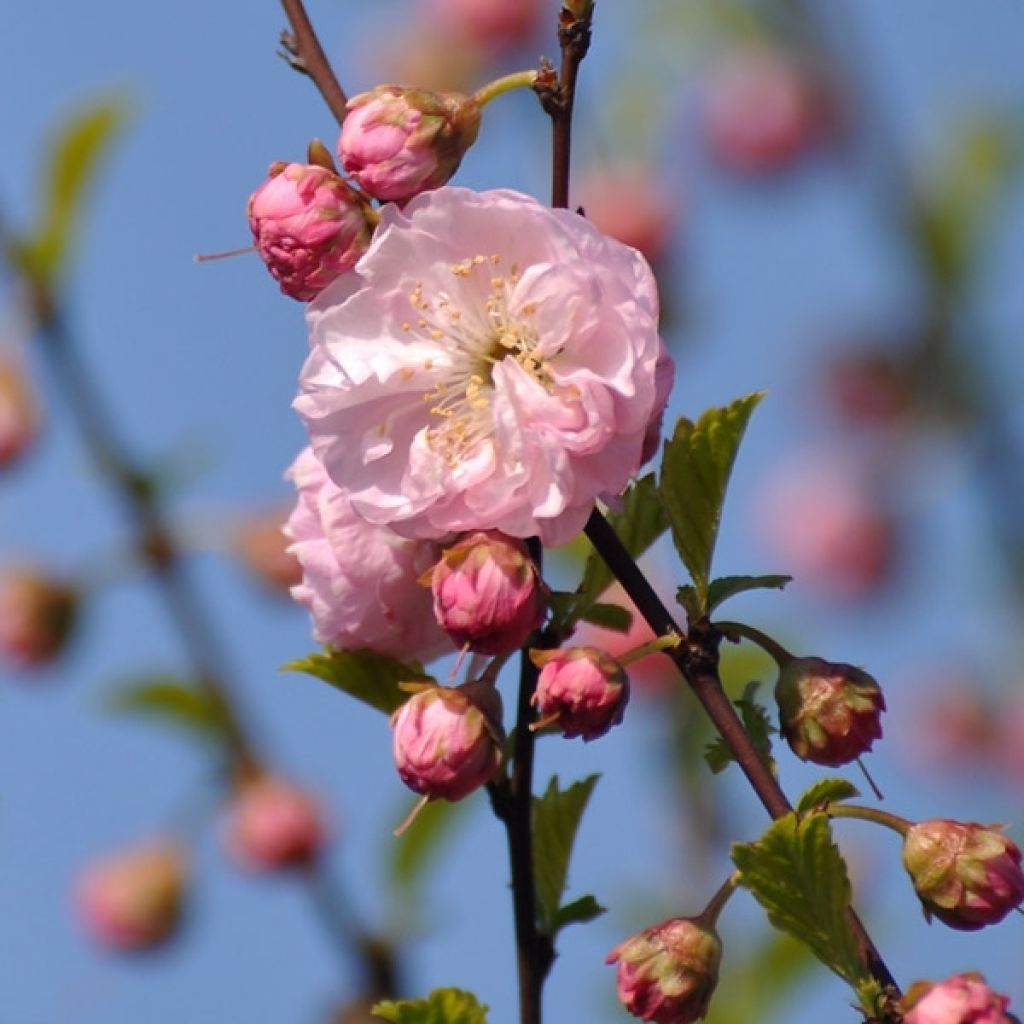

Amandier Texas Bio en racines nues, forme scion
Prunus dulcis Texas - Organic Almond Tree
Prunus dulcis Texas
Almond
This plant carries a 6 months recovery warranty
More information
We guarantee the quality of our plants for a full growing cycle, and will replace at our expense any plant that fails to recover under normal climatic and planting conditions.
Oversize package: home delivery by special carrier from €6.90 per order..
Express home delivery from €8.90.
Delivery to Corse prohibited: UE law prohibits the import of this plant from mainland France to Corse as part of the fight against Xylella fastidiosa. Please accept our sincere apologies.
More information
Description
The Almond tree or Prunus dulcis Texas is an interesting variety for late flowering, which allows it to be cultivated in the southern third of France, in a sheltered position however. It is also a productive and generous variety from a young age, with soft-shelled nuts that are easier to shell. While it is appreciated for its almonds, which are harvested in October, this Mediterranean fruit tree covered in soft pink flowers is a beautiful addition to the garden in late winter. In cultivation, the Texas Almond tree is often used as a pollinator. Indeed, almond trees are not self-fertile, meaning their pollen cannot fertilize their own flowers. It is necessary to plant at least two varieties to obtain fruits. Choose Ferragnes or Princess.
Plant from Organic Agriculture
The cultivated Almond tree (Prunus dulcis) belongs to the rose family, just like cherry and plum trees. It originated from the Caucasian almond tree, known as Prunus fenzliana, a shrub native to Armenia, Turkey, and Iran. It has been cultivated for a long time in the Mediterranean region, and for a few decades in many arid regions. In order to obtain fruits, it is imperative that the flowering period does not experience frost, which limits almond tree cultivation to areas with a Mediterranean-type climate and short winters: southern China, southwestern North America (California), South America (central Chile), South Africa, and Australia.
The Texas Almond tree was obtained in Texas (US) in 1891. It is a small tree with a spreading habit, semi-open crown, and ramified branches, reaching a height of about 5m (16ft) and a spread of 4m (13ft) at maturity. This variety starts producing almonds from a young age and can live for more than a century. It has simple, thin, and pointed leaves, measuring up to 8cm (3in) long and 2.5cm (1in) wide, with dentate margins. They are medium green and slightly glossy on the upper side. The deciduous foliage turns yellow in autumn before falling. Flowering occurs in March, on bare branches. It is abundant and slightly fragrant. Each flower has 5 petals in a soft pink colour and measures about 3.5cm (1in) in diameter. This flowering period produces high-quality nectar, highly sought after by bees at this time of the year. It is followed by the formation of oblong fruits covered with a velvety green-gray skin, measuring up to 4cm (2in) long. In late summer, the skin dries and splits, revealing the shell that protects the edible almond. The harvest of Texas almonds takes place in July-August for fresh almonds and in October for dried almonds.
During the first two years after planting, the almond tree is sensitive to frost, but then it is quite hardy, tolerating temperatures as low as -12°C (10.4°F). However, cold weather makes its fruiting unpredictable as the flowers are very early. It is difficult to harvest almonds above the Lyon region. The almond tree thrives best in dry, rocky, and limestone soils, even in full sun. This tree is sensitive to soils that retain moisture to such an extent that it can deteriorate rapidly within a few days.
In plant anatomy, the almond refers to the interior of the seed. The fruits of Prunus dulcis are called almonds because only this part is consumed. The pulp surrounding the stone is not edible. In addition to enjoying this delicious fruit, you can also appreciate its fragrant flowering, which heralds the arrival of spring.
For transportation reasons, our tallest scions may be pruned before shipment. They are suitable for all common training sizes: cordons, espaliers, goblets, half-standards, and low standards, except for high standards. If you would like more information or advice on training your fruit trees, please do not hesitate to contact us.
Report an error about the product description
Prunus dulcis Texas - Organic Almond Tree in pictures
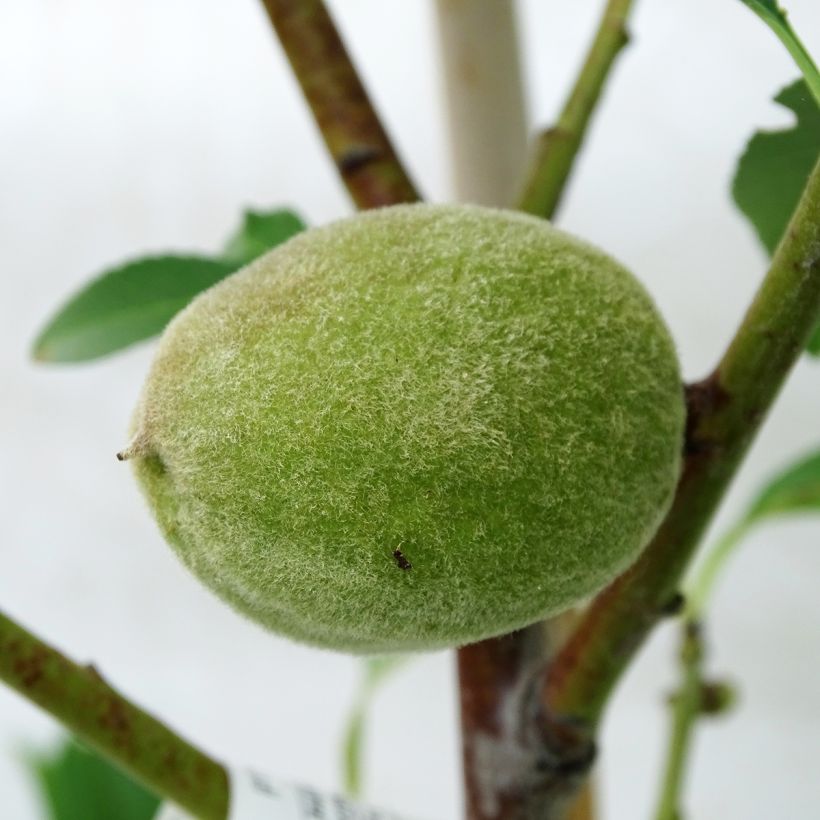

Plant habit
Fruit
Flowering
Foliage
Botanical data
Prunus
dulcis
Texas
Rosaceae
Almond
Cultivar or hybrid
Other Almond trees
Planting and care
Plant your Texas Almond preferably in autumn, if it is a replacement, avoid planting it in the same spot as a previous Almond tree. The almond tree requires well-drained soil, even rocky, and appreciates limestone soils. Its resistance to summer drought is excellent. However, clay soils that retain moisture are very harmful to it, as they can lead to the development of a fungus at the root level and the rapid death of the tree.
The production of almonds requires the proximity of another variety of Prunus dulcis. Remember that fences do not prevent pollinators from moving from one garden to another. Pruning is limited to light thinning in winter to encourage the formation of young shoots in spring. Remove dead wood and crossing branches. Optionally, in the first 3 or 4 years, you can be more severe and encourage the formation of 4 or 5 main branches, giving it a cup-shaped habit, traditional in fruit tree cultivation. You can harvest fresh or dried almonds, depending on your preference.
Planting period
Intended location
Care
This item has not been reviewed yet - be the first to leave a review about it.
Mediterranean fruit trees
Haven't found what you were looking for?
Hardiness is the lowest winter temperature a plant can endure without suffering serious damage or even dying. However, hardiness is affected by location (a sheltered area, such as a patio), protection (winter cover) and soil type (hardiness is improved by well-drained soil).

Photo Sharing Terms & Conditions
In order to encourage gardeners to interact and share their experiences, Promesse de fleurs offers various media enabling content to be uploaded onto its Site - in particular via the ‘Photo sharing’ module.
The User agrees to refrain from:
- Posting any content that is illegal, prejudicial, insulting, racist, inciteful to hatred, revisionist, contrary to public decency, that infringes on privacy or on the privacy rights of third parties, in particular the publicity rights of persons and goods, intellectual property rights, or the right to privacy.
- Submitting content on behalf of a third party;
- Impersonate the identity of a third party and/or publish any personal information about a third party;
In general, the User undertakes to refrain from any unethical behaviour.
All Content (in particular text, comments, files, images, photos, videos, creative works, etc.), which may be subject to property or intellectual property rights, image or other private rights, shall remain the property of the User, subject to the limited rights granted by the terms of the licence granted by Promesse de fleurs as stated below. Users are at liberty to publish or not to publish such Content on the Site, notably via the ‘Photo Sharing’ facility, and accept that this Content shall be made public and freely accessible, notably on the Internet.
Users further acknowledge, undertake to have ,and guarantee that they hold all necessary rights and permissions to publish such material on the Site, in particular with regard to the legislation in force pertaining to any privacy, property, intellectual property, image, or contractual rights, or rights of any other nature. By publishing such Content on the Site, Users acknowledge accepting full liability as publishers of the Content within the meaning of the law, and grant Promesse de fleurs, free of charge, an inclusive, worldwide licence for the said Content for the entire duration of its publication, including all reproduction, representation, up/downloading, displaying, performing, transmission, and storage rights.
Users also grant permission for their name to be linked to the Content and accept that this link may not always be made available.
By engaging in posting material, Users consent to their Content becoming automatically accessible on the Internet, in particular on other sites and/or blogs and/or web pages of the Promesse de fleurs site, including in particular social pages and the Promesse de fleurs catalogue.
Users may secure the removal of entrusted content free of charge by issuing a simple request via our contact form.
The flowering period indicated on our website applies to countries and regions located in USDA zone 8 (France, the United Kingdom, Ireland, the Netherlands, etc.)
It will vary according to where you live:
- In zones 9 to 10 (Italy, Spain, Greece, etc.), flowering will occur about 2 to 4 weeks earlier.
- In zones 6 to 7 (Germany, Poland, Slovenia, and lower mountainous regions), flowering will be delayed by 2 to 3 weeks.
- In zone 5 (Central Europe, Scandinavia), blooming will be delayed by 3 to 5 weeks.
In temperate climates, pruning of spring-flowering shrubs (forsythia, spireas, etc.) should be done just after flowering.
Pruning of summer-flowering shrubs (Indian Lilac, Perovskia, etc.) can be done in winter or spring.
In cold regions as well as with frost-sensitive plants, avoid pruning too early when severe frosts may still occur.
The planting period indicated on our website applies to countries and regions located in USDA zone 8 (France, United Kingdom, Ireland, Netherlands).
It will vary according to where you live:
- In Mediterranean zones (Marseille, Madrid, Milan, etc.), autumn and winter are the best planting periods.
- In continental zones (Strasbourg, Munich, Vienna, etc.), delay planting by 2 to 3 weeks in spring and bring it forward by 2 to 4 weeks in autumn.
- In mountainous regions (the Alps, Pyrenees, Carpathians, etc.), it is best to plant in late spring (May-June) or late summer (August-September).
The harvesting period indicated on our website applies to countries and regions in USDA zone 8 (France, England, Ireland, the Netherlands).
In colder areas (Scandinavia, Poland, Austria...) fruit and vegetable harvests are likely to be delayed by 3-4 weeks.
In warmer areas (Italy, Spain, Greece, etc.), harvesting will probably take place earlier, depending on weather conditions.
The sowing periods indicated on our website apply to countries and regions within USDA Zone 8 (France, UK, Ireland, Netherlands).
In colder areas (Scandinavia, Poland, Austria...), delay any outdoor sowing by 3-4 weeks, or sow under glass.
In warmer climes (Italy, Spain, Greece, etc.), bring outdoor sowing forward by a few weeks.

































